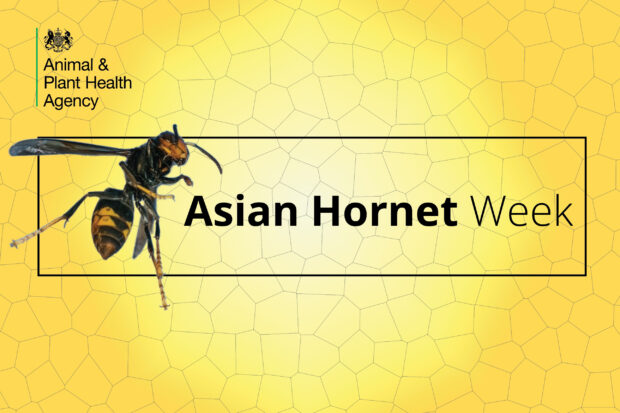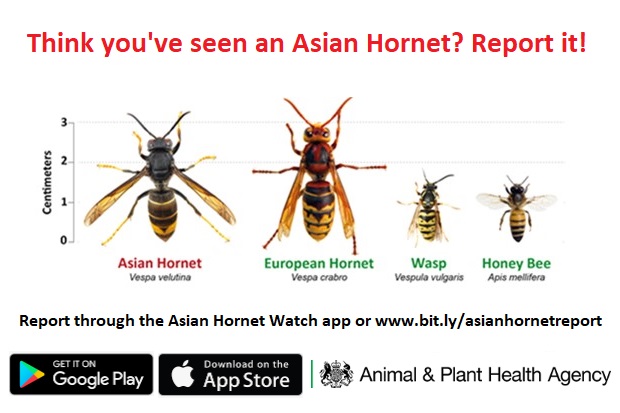
To mark this year’s Asian hornet week, Rebekah Clarkson from APHA’s National Bee Unit (NBU) talks about the work the NBU is doing to crack down on this invasive species and how you can report sightings.
Asian hornets are invasive non-native species which originate from Asia. In recent years they have colonised mainland Europe, and they now pose a significant threat to the United Kingdom’s native pollinators.
The work of the National Bee Unit (NBU)
In August 2023, the NBU found and destroyed a record number of nests in England. We even received two reports of two insects travelling on the Cherbourg-Poole ferry - one in spring and one in summer! A rolling update of findings can be found on the NBU’s BeeBase website.

Recent findings have included primary and secondary nests in Folkestone, Plymouth, and Maidstone. Normally, nests found low are primary nests, and nests found higher in trees are secondary nests. A queen starts a primary nest, but if the nest outgrows its position, or is disturbed, they may also build a higher, safer, warmer secondary nest. After the NBU locates a nest, we destroy it and then monitor for Asian hornets until no hornets are seen for five consecutive days. If Asian hornets continue to be caught, we continue our monitoring to check if another nest is present.

Asian hornet nest analysis
Nests and their contents are assessed to provide information on their relatedness to other findings and to gain information on its maturity. These attributes help guide future monitoring decisions.
-
- The first step is to take samples for DNA extraction from Asian hornets in and around a located nest.
- The samples and nest are then sent to our diagnostic laboratory (Fera). Here analysis is performed to compare the relatedness of the samples with other samples. Based on nest dissection and its content, an assessment is made on its maturity which gives an indication if new mated queens may have flown from the nest.
- In late autumn, when there are fewer nests to investigate, analysis is performed with findings from previous years. This helps inform our approach to future Asian hornet management in future.
How you can help in the fight against Asian hornets
With this year’s record number of incursions, we need you more than ever to help us locate nests which may be out there; so, this Asian hornet week please look out for Asian hornets in your garden.
Asian hornets can be spotted on flowering plants and, particularly at this time of year, on Ivy as well as fruit including apples, pears, plumbs and grapes. Whilst they are feeding, and if safe to do so, please take a photograph of it and send this to us via the Asian Hornet Watch app.
What to look out for
Asian hornets are mainly black in colour with yellow ends to their legs and a clear orange/yellow band of the abdomen.

For further information on Asian hornet identification, you can watch this video or look at our identification sheet.
How to report Asian hornet sightings
A quick and easy way to report sightings is by downloading and using the Asian Hornet Watch app.
The app was launched in 2017 by the UK Centre for Ecology & Hydrology (UK CEH) to make recording Asian hornet sightings as simple as possible. It provides lots of information on similar looking insects.

You can download the app for iPhone or Android.
An alternative to using the app is to complete our online recording form.
Sightings without photos need to include enough information to make it credible to trigger a visit from a British Beekeepers Association Asian Hornet Team member. Sightings become more credible if they include:
- your experience, for example if you are an entomologist or have seen Asian hornets before, for example in Jersey, or France.
- a good description of the observed insect.
- the behaviour of the hornet, what it is doing, is it on a bait you have placed or fallen fruit et cetera.
Last year UK CEH and the National Bee Unit looked through reports of more than 5,000 insects.
All reports are reviewed, and if a clear photo or enough detailed information is provided to make it credible, it is forwarded to the National Bee Unit to follow up. Many reports turn out to be similar looking insects to the Asian hornet such as the native European hornet. Credible reports without enough evidence are either asked for more detail, or forwarded to British Beekeepers Association Asian Hornet Teams, who help monitor for Asian hornets in the suspect area. You can find your local Asian Hornet Team Coordinator on the BBKA’s website.
Subscribe to our blog
Throughout the year, we publish blogs which highlight the breadth of scientific work we are involved in as well as sharing our latest news and events we have attended.
Subscribing to our blog takes seconds and you will receive instant email alerts as soon as new blogs are published so why not subscribe today!

11 comments
Comment by Kim cook posted on
We had a hornet nest in shed, had that removed had lots of larvy that was about two months ago., And we had one come in the house today and left out the window. My friend got stng today it was in her house she lives in puckeridge down the road.
Comment by Heather O'Sullivan posted on
If you believe your sightings to be Asian hornets, please follow the advice in this blog and embedded links to alert our staff.
Comment by Debbie Isitt posted on
I had what I believe to be an Asian Hornet in my bedroom this morning. It was huge and very noisy! I can't find where to report it anywhere?
Comment by Heather O'Sullivan posted on
Please see the 'how to report Asian hornet sightings' section at the end of the blog for information on how to report sightings.
Comment by Terry Hickman Smith posted on
I have a beehive at my home in Norfolk which has been left empty after my bees have died out (for reasons of swarming and no re-queening - not disease. It looks as if it has now been taken over by wasps.
I was preparing to have a proper inspection when I saw a hornet exit the hive and then tackle a wasp and wrestle it into the undergrowth. I have a video of it. I think the hornet is a European one not an Asian.
Would you like to see the video to be certain that I am correct in identification?
Comment by Heather O'Sullivan posted on
Hi Terry, please do report your sighting using the information given in this blog. Thank you.
Comment by Ash barber posted on
Just seen Asian hornet in bletchley milton Keynes
Comment by Daniel jones posted on
Asian hornets nest very large in roof of white house social club roof, Ashington Northumberland
Comment by Lisa Adey posted on
We had 3 or 4 days of Hornets coming in our house at night.
I think is more likely to be a European Hornet.
Comment by Michelle Greenslade posted on
I saw 2 aisian hornets at the back of my garden near a woodland path on my lilac Bush, I could not get close enough for a photo,upton Poole Dorset,
Comment by Fran posted on
I believe I saw a Japanese hornet this morning in Hythe Kent.